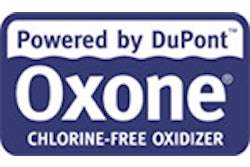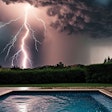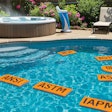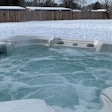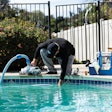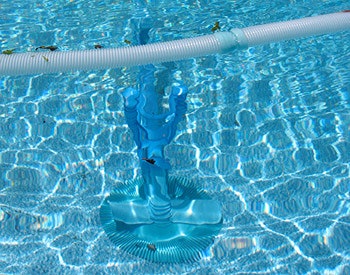
Automatic pool cleaners come in all shapes and sizes: small sharks that suck and scrub, big bulbous robots that blow and brush, wall creepers and surface skimmers. All do basically the same thing — pick up debris — and that thing is enormously helpful to the homeowners and pool techs they hire.
AQUA spoke with a couple of industry veterans about the ways they use APCs in their businesses, how they get homeowners to buy them, and whether robots in pools spell doom for the poolman.

Forty years ago, Steve White was a schoolteacher with a new summertime gig: diving into pools and finding leaks. Over the years that followed, White parlayed this unique talent into a second career, which eventually grew into a full-time pursuit.
Today, he's the owner and president of Underwater Pool Masters, a diverse service company in West Boylston, Mass., with a dozen employees and a half dozen trucks on the road daily.
"I'm a Certified Pool Operator instructor for the National Swimming Pool Foundation, and I'm on the board of directors for Region 9 of APSP," he says. "I'm also a CSP with them, and I'm an instructor for CSP level courses. And I have a full-blown service company and retail store. I've been doing this for about 40 years." And he's still diving into pools looking for leaks at age 65.
AQUA: For those new to the industry, tell us about the basic types of cleaners.
White: Cleaners have been on the market for any number of years. There used to be basically push-style cleaners and suction-style cleaners, both of which would depend on equipment adjacent to the pool plumbing, or connected to it. For example, push-side cleaner might be connected to the return line with a booster pump.
Then there are the suction-side cleaners, which go into skimmers and pull the dirt into the filter system. Those have been around for many years, too.
The third kind, and now probably the largest in terms of consumer interest, is the robotic cleaners. Those started off at brick-and-mortar specialty retailers, then they were in the Sam's Clubs of the world, and now they're on the Internet, and there are almost unlimited manufacturers of them. They have various price ranges and various levels of appeal to the customer in terms on styling, name and functionality. If you look on the Internet, or at any trade show, everybody has the newest and latest look, the cleaner that is the simplest to operate, does the best cleaning, etc. There is a lot of competition.
There really is a big market for a product that lets the homeowner do less work on his pool, and the automatic cleaner keeps the pools looking good.
AQUA: Which are most popular with your customers?
Well, the suction-side and return-side cleaners, even those with booster pumps, require additional attention to the equipment that runs them because a lot of times that dirt goes into the filter itself or into a mounted leaf-catching device, and all of these things add to the maintenance of the pool. I think robotic cleaners tend to be easier for customers — I had one in my own pool for eight years. You drop it in, it does its thing, you take it out, empty the bag out and put a new bag in. As a side note, I always recommend a person have two or three bags. You can take the one bag out when it's full, then put a clean bag in and wash the other one out at your leisure.
I think people have to understand with all these cleaners, however, that sometimes old pools aren't necessarily configured for them. And sometimes high main drains become a restriction for the cleaners. If you leave full suction on the main drain, they're going to find they're sucking the cleaner onto the main drain.
Is selling automatic cleaners a significant revenue source?
We do sell a number of cleaners, but we don't do a whole lot in terms of competing with the Internet. It's very difficult to sell a product in a brick-and-mortar building where you're paying for staff, educating that staff, insurance, rent and all that, then somebody buys that unit on the Internet. We're very partial to providing service for the cleaners we sell in the store, though. We will bring it to their property, show them how to connect it, how to use it in their pool, how to use the controller. But I'm very reluctant to get excited about somebody who buys a cleaner on the Internet and then expects me to have repair parts for it. It's really not fair.
If I go to my dentist with a tooth I bought then say, 'Can you put this tooth in for me properly?' What do you think he'd say? I think he'd laugh me out of the office. What's to say that if I go out of my way to sell somebody a cleaner and show them how it works, they're not going to say, 'This is great, but it costs a little more than buying it on the Internet.' Well, how much effort I should even put into it if that customer is just going to buy it on the Internet?
We think there's clearly a market for selling them, but it's really important how you present them to the homeowner. It's not just what the literature says, but what the professional can sell to them, which is personal experience.
What do you stress to the homeowner beyond what they can read in a brochure?
It's not necessarily the look; it's the reputation of the cleaner. There was a vacuum cleaner company that came out with an underwater cleaner. I can see the connection, but it takes more than just a name brand you recognize to make a good cleaner.
You also have to consider repairs. If you buy a cleaner, maybe from $800 all the way up to commercial cleaners costing $10,000, they'll do a good job. But they also need to be serviceable; you want to be able to access all the parts, and you have to have the parts. That's essential. Nobody wants to buy a car, then go into the dealer and say, 'I've got this wicked pulling to the left,' then have the guy come back and say, 'Yeah, that's common for this vehicle, but we can't fix it because we don't have the parts.' So now you just have to go down the road crooked. It's kind of the same thing with cleaners.
Years ago I sold a cleaner to a customer. This was early in my career, about 20 years ago. The customers came and got it, brought the cleaner to their house, set it up and loved it. About a week later, on a Saturday when I had a bunch of people in my store, the woman came in with the cleaner in a bucket, drops it out the counter and said, 'You're a bandit for selling me this cleaner. My neighbor bought one down at B.J.'s for $300 less. I'm going to go there and get one myself!' Now, what did my other customers that were in the store think? Well, the way I see it, the other unit might have been not as good, but the reality to the customer was that I was overcharging. They just looked at the name, and the price. And I have not bought from that manufacturer since. I was told the unit was for brick-and-mortar professionals. They told me, 'That other one is a different style. It's not as good as the one you sold.' Well, how can I convince that customer of that? She's already left the store thinking I'm a bandit."
Do you ever have customers that feel they'll no longer need you once they purchase a cleaner?
That can be an issue. It's analogous to chlorine generation by salt. I was very reluctant to get into that on my retail and service end. If I can make gas in my backyard, I'm not going to go to the gas station anymore, right? But now when we do sell generators, we are careful to point out to the customers that they don't do water testing and water treatment. Well, it's the same with the cleaners. They will simplify a maintenance program. There's no question. And they're a profit center for the service and retail stores that sell them. A cleaner is going to clean the floor of the pool and scrub the walls and maybe filter the water a little bit as it goes, but it's not going to tell you if you have a leak in the plumbing. It's not going to tell you if your water chemistry is off. With a maintenance program, you get an educated CPO that will come out to the property, check the water on a regular basis, clean inside the skimmer basket. Automatic cleaners don't do that. Cleaners don't backwash filters. What they do is support what we do. Maybe if they have a cleaner we can come every two weeks instead of every week, but they can't replace us.
Any final thoughts?
In closing, I can say this: All automatic cleaners have the advantage of independence from the regular equipment. No. 2, they allow whoever is maintaining that pool the chance to get something done while they're not paying attention to it. Years ago my mother would put a roast into the crock pot in the morning, then at night it would be done. It's just like a cleaner.
The other thing is they all try to compete with one another on features. This one goes up the wall, that one does an irregularly shaped pool, this one does vinyl and gunite. That's the American Way. So I'm not saying it's bad. I'm just saying you only need a certain number of features. It has to be rugged, and it has to be easy to handle.
It's another good tool for service. It can make our work easier, and make the customer's time owning a pool better.

Jim Deberry is the general manager for Pool Service America, a Florida pool service, repair and renovation giant based in North Miami Beach with clients throughout Broward and Miami-Dade counties.
"We don't give out the exact figure of clients," Deberry says. "But our base is in the high hundreds. We're an upper-tier service company."
Though he's only been a qualifier for PSA for three years, he's come to greatly appreciate the automatic pool cleaner and its role in helping the service tech help his or her customers.
AQUA: how do you use automatic pool cleaners in the business?
Deberry: They're a key part of what we do, and about 50 percent of our service customers have them in their pools. Suction-side cleaners, like Kreepy Krauly, they're really great for us. A lot of our customers are affluent and live in areas with heavy foliage. So if we're only there once or twice a week, that cleaner is able to pick up the debris. Some of the cleaners we use, such as the Great White, have bristles in addition to the suction, so there's some added benefit there.
On a typical pool, if the pump is running eight hours a day, we'll go ahead and open up their cleaner lines to run about 70 percent and the main drains at 30 percent, so they're running at the same time as the pump is.
When we start we do what's called a "clean and balance" on initial service. So we'll drop a cleaner in to help clean a pool that's new on service, because we're not there to give it every-day attention, and the customer isn't going to want us to come out five times to balance it and turn it to blue if it's been neglected. So we do, at times, drop them off, as well.
AQUA: Does that demonstration sometimes lead to an APC sale?
Yes. That happens a lot, where the customer has already purchased the service, they'll often purchase the cleaner, as well.
It's an easy add-on. And it doesn't hurt our business, because the cleaner doesn't balance the pool, it doesn't add chemicals. What it does is help keep the debris out of the pool and the algae off the walls. It takes care of the visible things.
AQUA: Do some customers think, "Hey, now that I've got this, I don't even need you guys anymore"?
First of all, we're not afraid to sell pool cleaners. Our technicians aren't called pool cleaners, they're called recreational water professionals, and there's a huge difference.
We do explain to them what we call the "Pool Service America Difference." We aren't afraid to tell our customers to use a cleaner, such as a suction-side device like a Kreepy Krauly, again, because what we offer is the chemical management that the cleaner can't. The cleaner is essentially a robot, and it can only do so much. You really need the brain inside of a person that can do that science-based chemical management.
Customers tend to want what their neighbors have, and a lot of neighbors do have them. But it doesn't test for chemicals and it doesn't have a brain. So the technician can still do his job without worrying about that job being eliminated.
AQUA: What about pressure-side?
Pressure-side cleaners in our market just aren't as common, but we do have customers that use them. They require booster pumps — brands like the Polaris brand. They're great cleaners, as well, but they're more for the homeowner that's going to service the pool himself, as opposed to someone who's going to hire us, because that homeowner is a little more into servicing their pool, they may have a little more time and get a sense of pride from doing it themselves. So for that reason we don't run into them as often.
A pressure-side cleaner, in our customers' eyes, is a little more quality. But it does cost more and there's more maintenance associated with it, as well as the booster pump that may be required. So that's a part of why we don't see as many.
AQUA: Do you ever drop them off, then come back and pick them up?
No, we like to have a cleaner stay in there and do its job. A suction-side cleaner is meant to be kept in a pool on a daily basis, not pulled out. And it's not meant to replace the labor that our recreational water professional provides.
AQUA: What do you look for in a good automatic pool cleaner?
I'm not going to get too specific, but what I would recommend is getting one with the fewest number of parts that can break down, something that has bristles to brush the walls, and one that has the biggest orifice to suck, or, on the pressure side, to bag. I'd also recommend you put a leaf trap to catch the extra debris. Without the leaf trap you have potential for clogs, for blowing out the motor.
Another thing to remember is if you have your main drain open at a higher percentage on your valve, you can possibly get the cleaner stuck on a suction-side cleaner. You certainly don't want it stuck on the main drain the whole time it's running. You can avoid that by closing the suction to the main drain, or limiting it to a very small amount of suction to the main drain.
AQUA: Anything else?
I recommend all homeowners use them for quality pool maintenance. Not having one is kind of like owning a home and not vacuuming it or not mopping the floor. It's something that needs to be done. At the very least, if a person isn't going to hire a pool service company, they should have a vacuum vacuuming their pool on a daily basis. So I do recommend all homeowners use them.
Comments or thoughts on this article? Please e-mail [email protected].

























